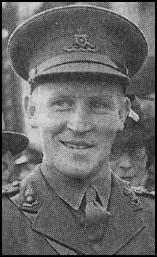Peter Porteous

Patrick Porteous, the son of an Indian Army brigadier general, was born in Abbottabad, India, on 1st January 1918. After being educated at Wellington School he entered the Royal Military Academy at Woolwich.
Porteous was commissioned into the Royal Artillery in 1937. He served with the British Expeditionary Force (BEF) in France and was evacuated from Dunkirk in May 1940. Later that year he joined the 4th Commando Regiment.
In April 1942 General Bernard Montgomery and Admiral Louis Mountbatten began to plan the Dieppe Raid. It was originally due to take place in July but bad weather resulted in it being postponed until August.
On 19th August 1942 a small mixed force of 5,000 Canadian and 1,000 British troops landed at Dieppe. This included Porteous whose task was to organize an attack on a six-gun German battery near Varengeville. Although wounded through the hand and upper arm early in the raid, he led his men across 250 yards of open ground and through barbed wire defences. Despite heavy machine-gun fire, Porteous and his men took the battery with a bayonet assault.
During the Dieppe Raid 4,000 of the men were either killed, wounded or captured. Porteous, despite being wounded again, this time in the thigh, managed to get back to England where he was awarded the Victoria Cross.
After making a full recovery Porteous was promoted to second in command of the 4th Commando Regiment and took part in the D-Day landings in June, 1944.
Porteous's post-war career included service in Palestine, Germany and Singapore and was commander of the Junior Leaders' Regiment (1960-63). He was also commander of the Rheindahlen Garrison of the British Army of the Rhine when he retired in 1970. Patrick Porteous died on 9th October 2000.
